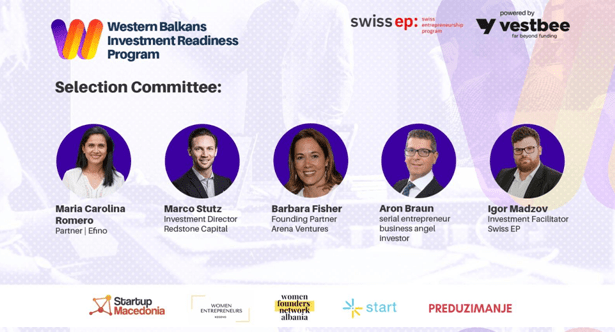Lack of private capital has been one of the biggest challenges for most startups across the Western Balkans. To overcome this challenge, startups themselves need to become better at fundraising and initiating the investment process.
Additionally, many investors are not aware of the Western Balkans’ potential when it comes to innovation.
Opportunities such as the Western Balkans Investment Readiness Program aim to tackle both issues, putting the region in the investment spotlight in the upcoming year.
“This year the Western Balkans was at the absolute bottom of Central Eastern Europe by capital raised. This program is our effort to truly do something about it by combining our forces with multiple ecosystem actors in the region and over 50 investors looking to support WB Startups”, says Igor Madzov, investment facilitator at the Swiss Entrepreneurship Program, one of the main organizers of the program.
Other organizers and supporters of the first edition of the program include Vestbee and local ecosystem partners in Albania (Women Founders Network Albania), Bosnia and Herzegovina (Start), Kosovo (Women Entrepreneurs Kosovo), North Macedonia (Startup Macedonia), and Serbia (Preduzimanje).
€100K to €1M tickets
“With this first Western Balkans Investment Readiness Program we aim to tackle both challenges and enable startups get access to regional and international investors, learn from the best experts, mentors, and startups that raised before, to find out how to close an investment in under six months, and connect with peers from the entire Western Balkans”, Madzov tells The Recursive.
So far, there is significant interest from both investors and startups, Madzov explains. When the program started, the organizers aimed to attract 30 investors. However, now it has over 50 international investors (business angels, angel groups, VCs, CVCs), illustrating incredible interest in what the region has to offer.
Startups applying for the program need to have their product launched on the market or tested with clients, search for an investment equity between €100K and €1M, and can commit one of its team members to participate in the program for 8 hours per week for 6 weeks.
During the learning journey, 50 selected startups will have an opportunity to work with proven experts from different fields. Afterward, each startup chosen in the Top 20 will be mentored by experienced investors, and at the program’s final event, startups will be able to meet over 30 investors from all over the world and present their businesses.
Improving the fundraising game
“This program is tech-focused and is industry-agnostic. We see a large interest from investors for AI, deeptech, agritech, fintech, medtech, HRtech, IoT, etc and mostly B2B solutions for what this region is highly known for. The high rise of e-commerce created interest for marketplaces that can become regional champions and utilize even the small WB market with B2C solutions”, Madzov adds.

One of the program’s biggest benefits is to create a safe environment for startups where they can improve their fundraising game and receive inputs from a large pool of experts, startups, and investors that will support them in the fundraising.
FinqUP, formerly known as Project Robin Hood Reloaded, is a young fintech startup from North Macedonia that has also applied for the program. For FinqUP’s CEO and founder, Dime Galapchev, being a part of the WB IRP is an excellent opportunity for rising startups from the region.
“It is a great opportunity for those looking for better ways to optimize their product and get higher investments with better partners. We expect productive networking with both startups, mentors, as well as investors, which are crucial in the early stages of any company”, Galapchev tells The Recursive.
How to apply
Applying for the program is open until December 27. Eligible applicants include startups with the founding team based in Albania, Bosnia and Herzegovina, Kosovo, North Macedonia, or Serbia, where the team is developing a tech product (software or hardware) with a focus on business clients.
“If I need to portray the perfect candidate for this program, this is a startup with a team in the Western Balkans that have already some traction and were able to test and apply their solution with clients in some foreign markets. If they believe that with their unique tech they can challenge current niche leaders on a global stage, this would be amazing”, Madzov concludes.








